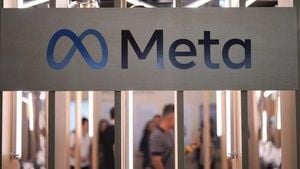In a world where the role of educators is being scrutinized, a private school in Austin, Texas, is making bold strides with a pioneering educational model. Alpha School is embracing artificial intelligence (AI) to fill the voids left by a shortage of teachers and to provide a customized, modern learning experience.
Walking into Alpha School, the first thing that catches your eye is not a traditional classroom filled with desks and a chalkboard, but a space buzzing with energy and innovation. Here, the lines between teacher and student are blurred, with AI stepping up to the plate as the primary educator. Founder MacKenzie Price's brainchild focuses on utilizing AI to teach core subjects, allowing human guides to concentrate on coaching and facilitating a love for learning.
"We don't have teachers," Price explains. "Instead, we have guides who engage with the students. They're helping the kids set goals, monitor academic progress, and spark interest in various subjects." The concept may seem futuristic, but with technology advancing at a breakneck pace, it might be a glimpse into the future of education.
The day at Alpha begins differently from most schools. For the first two hours, students engage with AI for lessons in math, reading, and history. The AI tailors these lessons to the individual needs of each student, ensuring that they are neither bored nor overwhelmed. These interactions aren't just about rote learning; they involve feedback that helps students understand why an answer is correct, thus deepening their comprehension.
One fifth-grader, Byron, loves this approach. "It explains a detailed explanation of why the correct answer is correct, not just saying, 'Oh, here's your correct answer'," he says. Byron's enthusiasm highlights one of the primary benefits of AI in the classroom: immediate, detailed feedback.
The utilization of AI addresses significant issues plaguing the education sector today. In many areas, notably underserved communities, there's a glaring shortage of qualified educators. In states like Delaware, for example, a stark disparity exists between the number of teachers and the student population. AI can serve as a stopgap, ensuring that educational standards don't plummet due to a lack of human resources. Moreover, AI can significantly reduce the teacher-to-student ratio, enhancing personalized learning experiences.
Alpha's model doesn't just rely on AI for core subjects; it complements these lessons with life skills workshops for the remaining hours of the school day. These workshops cover a spectrum of activities, from public speaking to overcoming challenges, and are designed to equip students with skills essential for adult life. One workshop even involves coding exercises that culminate in programming self-driving cars on a miniature racetrack.
Price launched this avant-garde concept from her home back in 2014. "Being a mom, I had two girls in the traditional school system. About two and a half years in, my daughter came to me one day and just said, 'school is so boring'," Price recalls. "It was then I realized something had to change." Since then, Alpha has grown to encompass three campuses, with the newest in partnership with SpaceX in Brownsville.
However, the high cost of such a model raises concerns about accessibility and equity, potentially widening the gap between different socioeconomic groups. Tuition at Alpha is a hefty $40,000 per year, though Price notes that three-quarters of the students receive some form of financial aid.
Despite these challenges, the potential benefits of an AI-driven educational model are impressive. Customized learning plans ensure that every student is taught at their appropriate level, fostering better comprehension and engagement. AI's ability to alter its teaching methods based on instant feedback can help students grasp difficult concepts more effectively.
The adoption of AI in education also highlights broader implications for the future workplace. The skills students develop in these AI-centered environments, such as critical thinking, collaboration, and adaptability, are precisely those required in the modern job market. Hence, while AI cannot entirely replace human teachers—considering their irreplaceable role in nurturing empathy and social skills—it can certainly complement them, reshaping education as we know it.
For Price, the ultimate goal is clear: "I wake up every morning asking, 'How can we get this out to more and more kids?'" She urges schools to keep an open mind about integrating AI, much like the Internet became indispensable to education a couple of decades ago.
In this ever-evolving educational landscape, Alpha School stands as a testament to the power of blending technology with human ingenuity. The debate about AI in classrooms is far from settled, but as Alpha's success stories accumulate, they offer a glimpse into what the future of learning might hold. "We don't want to use it for cheating," Price emphasizes. "We want to use it to supercharge what we can do."



